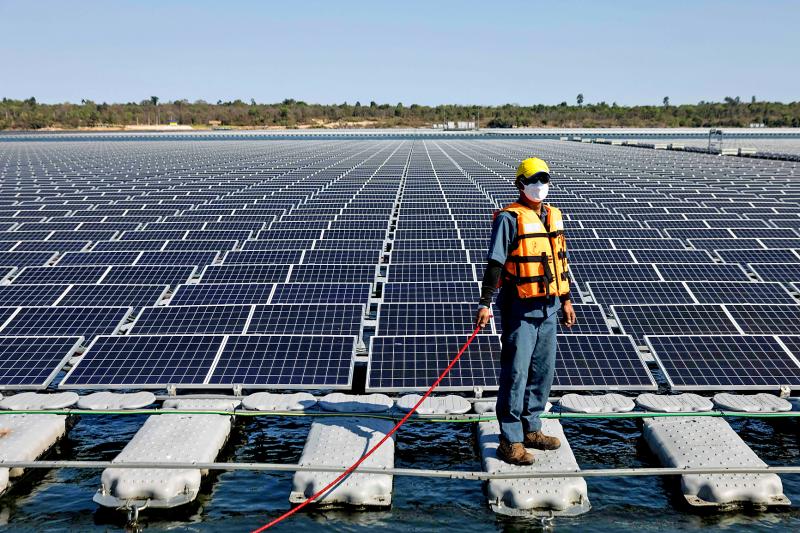A vast array of solar panels floats on the shimmering waters of a reservoir in northeast Thailand, symbolizing the kingdom’s drive toward clean energy as it seeks to achieve carbon neutrality by 2050.
The immense installation, covering 720,000m2 of water surface, is a hybrid system that converts sunlight to electricity by day and generates hydropower by night.
Touted by the authorities as the “world’s largest floating hydro-solar farm,” the project at the Sirindhorn Dam in the northeastern province of Ubon Ratchathani is the first of 15 such farms that Thailand plans to build by 2037.

Photo: AFP
The kingdom is stepping up efforts to wean itself off fossil fuels, and at the COP26 climate conference in Glasgow last year, Thai Prime Minister Prayuth Chan-ocha set the target of carbon neutrality by 2050, followed by net-zero greenhouse emissions by 2065.
The farm on the Sirindhorn Dam — which began operations last October — has more than 144,000 solar cells, covering the same area as 70 soccer fields, and can generate 45 megawatts (MW) of electricity.
“We can claim that through 45MW combined with a hydropower and energy management system for solar and hydro powers, this is the first and biggest project in the world,” Electricity Generating Authority of Thailand deputy governor Prasertsak Cherngchawano said.
The hybrid energy project aims to reduce carbon dioxide emissions by 47,000 tonnes per year and to support Thailand’s push toward generating 30 percent of its energy from renewables by 2037, the public utility said.
However, hitting these targets requires a major revamp of the kingdom’s power generation.
Thailand relies heavily on fossil fuel, with 55 percent of power derived from natural gas as of October last year, compared with 11 percent from renewables and hydropower, the Thai Energy Policy and Planning Office said.
The public utility plans to gradually install floating hydro-solar farms in 15 more dams across Thailand by 2037, with a total power generation capacity of 2,725MW.
The US$35 million Sirindhorn project took nearly two years to build — including COVID-19 holdups caused by delays to solar panel deliveries and technicians falling sick.
Most of the electricity generated by the floating hydro-solar farm goes to the provincial electricity authority, which distributes power to homes and businesses in provinces in the lower northeastern region of Thailand.
As well as generating power, officials hope that the giant solar farm will also prove a draw for tourists.
A 415m-long “Nature Walkway” shaped like a sunray has been installed to give panoramic views of the reservoir and floating solar cells.
“When I learned that this dam had the world’s biggest hydro-solar farm, I knew it was worth seeing with my own eyes,” tourist Duangrat Meesit, 46, said.
Some locals have reservations about the floating hydro-solar farm, with fishers complaining that they have been forced to change where they cast their nets.
“The number of fish caught has dropped, so we have less income,” village headman Thongphon Mobmai, 64, said. “But locals have to accept this mandate for community development envisioned by the state.”
However, the public utility insists that the project will not affect agriculture, fishing or other community activities.
“We’ve only used 0.2 to 0.3 percent of the dam’s surface area. People can make use of the land for agriculture, residences and other purposes,” Prasertsak said.

A beauty queen who pulled out of the Miss South Africa competition when her nationality was questioned has said she wants to relocate to Nigeria, after coming second in the Miss Universe pageant while representing the West African country. Chidimma Adetshina, whose father is Nigerian, was crowned Miss Universe Africa and Oceania and was runner-up to Denmark’s Victoria Kjar Theilvig in Mexico on Saturday night. The 23-year-old law student withdrew from the Miss South Africa competition in August, saying that she needed to protect herself and her family after the government alleged that her mother had stolen the identity of a South

BELT-TIGHTENING: Chinese investments in Cambodia are projected to drop to US$35 million in 2026 from more than US$420 million in 2021 At a ceremony in August, Cambodian Prime Minister Hun Manet knelt to receive blessings from saffron-robed monks as fireworks and balloons heralded the breaking of ground for a canal he hoped would transform his country’s economic fortunes. Addressing hundreds of people waving the Cambodian flag, Hun Manet said China would contribute 49 percent to the funding of the Funan Techo Canal that would link the Mekong River to the Gulf of Thailand and reduce Cambodia’s shipping reliance on Vietnam. Cambodia’s government estimates the strategic, if contentious, infrastructure project would cost US$1.7 billion, nearly 4 percent of the nation’s annual GDP. However, months later,

Texas’ education board on Friday voted to allow Bible-infused teachings in elementary schools, joining other Republican-led US states that pushed this year to give religion a larger presence in public classrooms. The curriculum adopted by the Texas State Board of Education, which is controlled by elected Republicans, is optional for schools to adopt, but they would receive additional funding if they do so. The materials could appear in classrooms as early as next school year. Republican Texas Governor Greg Abbott has voiced support for the lesson plans, which were provided by the state’s education agency that oversees the more than

Ireland, the UK and France faced travel chaos on Saturday and one person died as a winter storm battered northwest Europe with strong winds, heavy rain, snow and ice. Hampshire Police in southern England said a man died after a tree fell onto a car on a major road near Winchester early in the day. Police in West Yorkshire said they were probing whether a second death from a traffic incident was linked to the storm. It is understood the road was not icy at the time of the incident. Storm Bert left at least 60,000 properties in Ireland without power, and closed